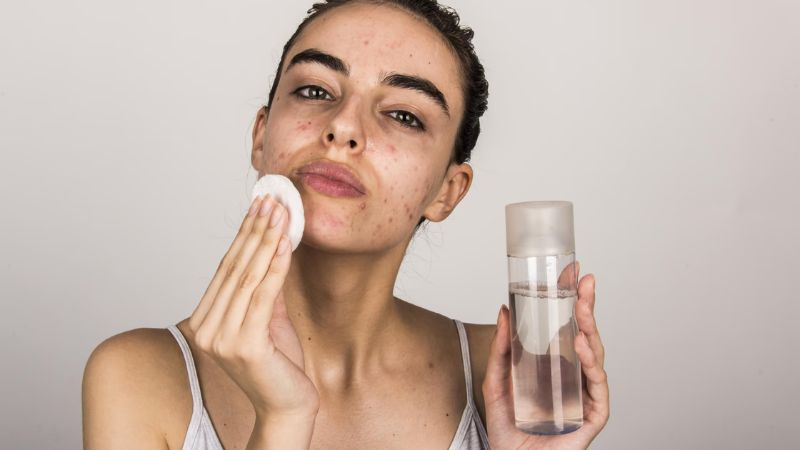Achieving clear, healthy skin can be a challenge, especially if you’re dealing with acne. But with the right skincare routine, it’s possible to manage and improve acne-prone skin. Finding a routine that works for you starts with understanding your skin type and incorporating products that help reduce breakouts while keeping your skin balanced.
Whether it’s controlling oil, soothing inflammation, or preventing clogged pores, each step plays a vital role in maintaining healthy skin. In this blog, we’ll explore The Ultimate Skincare Routine For Acne Prone Skin, offering tips and recommendations to help you achieve clearer, more radiant skin.
The Ultimate Skincare Routine For Acne Prone Skin
1: Cleansing the Right Way
Any skincare regimen must start with cleansing, especially for skin that is prone to acne. It helps remove excess oil, dirt, makeup, and impurities that can clog pores and trigger breakouts. However, it’s crucial to choose a gentle, non-comedogenic cleanser to avoid stripping the skin of its natural moisture.
A harsh cleanser can lead to dryness and irritation, causing the skin to produce even more oil as a defense mechanism. Cleansing should be done twice a day—morning and night—to keep the skin clean and refreshed. Look for ingredients like salicylic acid, which can penetrate the pores to remove oil buildup and dead skin cells. This will prevent clogged pores and reduce the chance of new acne forming.
Also Read:- How To Layer Your Skincare Products
2: Exfoliating Without Irritation
Exfoliation is an important step in keeping acne-prone skin clear, but it must be done carefully. Exfoliating helps remove dead skin cells that can build up and block pores, leading to acne. However, over-exfoliation can cause irritation, redness, and worsen breakouts. For acne-prone skin, using a chemical exfoliant like glycolic acid or lactic acid is more effective than physical scrubs, which can be too harsh.
These chemical exfoliants gently dissolve dead skin cells without damaging the surface of the skin. It’s recommended to exfoliate 2-3 times a week, depending on your skin’s tolerance. Consistent exfoliation helps prevent clogged pores, keeps the skin smooth, and allows acne treatments to penetrate more effectively.
3: Hydration and Moisturizing
Many people with acne-prone skin avoid moisturizers out of fear that they will make their skin oilier and cause more breakouts. However, proper hydration is essential for maintaining a healthy skin barrier and preventing the skin from producing excess oil. A lightweight, oil-free, and non-comedogenic moisturizer will provide the necessary hydration without clogging pores.
Ingredients like hyaluronic acid are excellent for drawing moisture into the skin without adding any greasiness. Gel-based moisturizers are particularly beneficial for acne-prone skin because they offer hydration in a lightweight form that absorbs quickly. Keeping the skin moisturized ensures that the skin remains balanced and reduces the risk of overcompensation through oil production.
4: Targeted Acne Treatments
To treat active breakouts and prevent future ones, incorporating targeted acne treatments is essential. Look for ingredients such as benzoyl peroxide, which helps to kill acne-causing bacteria, and salicylic acid, which exfoliates inside the pores and reduces oil buildup. These ingredients are highly effective in reducing inflammation and promoting clearer skin.
For those with more severe acne, retinoids can be included in the routine to accelerate skin cell turnover and prevent clogged pores. Spot treatments can be used directly on pimples to reduce their size and redness overnight. When applying treatments, it’s important to focus on problem areas without overloading the skin, as this can cause unnecessary irritation.
5: Sun Protection for Acne-Prone Skin
Sun protection is a vital part of any skincare routine, even for those with acne-prone skin. While some believe that sun exposure can help “dry out” pimples, it can actually worsen acne and cause dark spots or hyperpigmentation. Using sunscreen specifically designed for acne-prone skin, such as a non-comedogenic, oil-free formula, protects the skin without clogging pores.
Look for sunscreens that contain zinc oxide or titanium dioxide, which provide physical protection and are gentle on sensitive skin. Sunscreen should be applied daily, even on cloudy days, to protect the skin from harmful UV rays that can damage and age the skin. Consistent sun protection helps to maintain an even skin tone and prevent acne scars from worsening.
Also Read:- Skin Care Habits That Can Worsen Acne
6: Maintaining Consistency and Patience
Acne-prone skin requires consistent care and patience. While it can be tempting to try new products frequently in the hope of finding a quick fix, constantly changing your skincare routine can confuse your skin and make breakouts worse. Stick with a simple, effective routine that includes cleansing, exfoliating, moisturizing, and targeted treatments.
It can take weeks or even months to see significant improvements, so be patient. Additionally, it’s important to avoid picking or squeezing pimples, as this can lead to scarring and spread bacteria. Managing stress, maintaining a balanced diet, and getting enough sleep also play a role in improving skin health and reducing acne.
Conclusion
Creating an effective skincare routine for acne-prone skin takes patience and consistency. By choosing the right products and following a gentle, targeted approach, you can manage acne and achieve healthier skin over time. Remember, everyone’s skin is different, so it may take time to find what works best for you. Stick to the routine, and your skin will thank you.
FAQs
What is the best skincare routine for acne-prone skin?
A routine that includes gentle cleansing, exfoliation, hydration, and acne-fighting ingredients like salicylic acid and benzoyl peroxide can help manage breakouts.
How often should I exfoliate acne-prone skin?
Exfoliating 2-3 times a week is ideal for acne-prone skin. Over-exfoliating can cause irritation and worsen breakouts.


